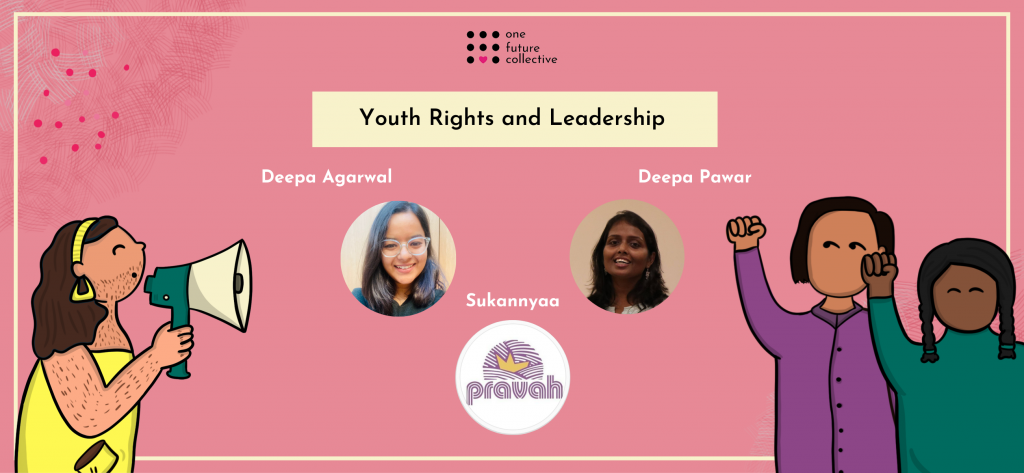On the 24th of February, we at One Future Collective hosted an IG Live on ‘Youth Rights and Leadership’. With Deepa as the moderator, a former One Future Fellow and we were joined by Deepa Pawar, the founder of Anubhuti and Sukannyaa, a member of Pravah.
Deepa started by asking what the speakers’ definitions of youth rights were. Deepa Pawar takes the examples of Babasaheb Ambedkar and Savitribai Phule who were young themselves when they started working on creating a change. This shows how important youth rights are in a country like India. We must all help in building a stronger bridge to connect the effort of the youth in taking part in the revolution and we must be inclusive in this effort. According to her, youth rights are no separate component of the values of India’s constitution. However, they do require more attention to the process and implementation.
Sukannyaa believes the stage between adolescence and adulthood is a very important and eye-opening phase where one experiences many aspects of life like work, justice, and equality in a different light. Each person experiences unique challenges and difficulties in this journey. We must highlight these challenges and bring them into mainstream conversations.
Pravah does this on three levels: First is by changing the way we view the youth and avoiding stereotypes where we look down on them or view them through a tokenistic lens of pawns needed to create a better economy. This in turn avoids creating a barrier and empowers the youth. The second is by creating spaces for the youth to represent their communities when it comes to conversations around rights and equality and doing this through an intersectional perspective. The third is by questioning ourselves on how we can create safe environments for the youth to work and build on their strengths and meet people of different identities.
Deepa then goes on to question how Anubhuti has made sure to address intersectionality in its efforts. Deepa Pawar highlights how there is a common misconception that the youth are not interested in politics in general. Engagement in politics must be created in educational institutions, but when these institutions shun students from understanding, critiquing, and participating in politics it creates a bad environment. These spaces must promote political literacy and not political hatred. Anubhuti works as a mirror to show the youth what they can do. The youth have their own lived experiences to reflect on and we try our best to question the root causes of these experiences. Fortunately, the marginalized communities of our country, be it nomadic tribes, the trans community, or working women are naturally equipped to understand the issues that all Anubhuti has to do as an organization, is to facilitate. Deepa reminisces about this process and says it’s been a two-way street. Anubhuti has learned just as much as it has taught while working with the young.
The statement ‘personal is political’ rings true to covering intersectionality. For instance, being a woman, you naturally are drawn to and affected by women’s rights. Anubhuti designs its approach underlining these specific identities as these identities dictate the strengths, challenges, and living situations of these individuals.
Deepa then goes on to ask Sukannyaa how Pravah has made efforts to create a safe environment for young people to grow. Sukannya addresses how Pravah tries to create these spaces without setting prior expectations that are often a burden and allows the youth to create and explore on their own. Our internship programs also see people from different parts of India such as Jammu and Kashmir and the south as well interacting among themselves. This not only is educative but also increases empathy for those different from us.
Deepa Pawar says that creating these spaces is not easy, especially in movements. Asking questions has become more and more dangerous over time. We are indoctrinated with the ideology that marginalized communities do not and should not be given the capacity to participate in political scenarios. Fighting such social biases is no easy feat. When speaking about these safe spaces, Deepa wishes to highlight the need for a support system to rescue the youth when they are caught in the realms of authority for standing up.
The panel concluded the talk by lending their idea of the concept ‘Young Feminist People Power’. Sukkannyaa believes this concept stretches itself to all forms of representation. Deepa Pawar then questions why we still don’t recognize the feminist movements native to India far before the movement was given a name in the west. Savitribai Phule and Fatima are perhaps the best examples of Young Feminist People Power narratives. She wishes for us to resurface these narratives, learn from the past experiences of the women that have helped create a change with integrity and create our own stories as we go on.
You can watch the full video here: https://www.instagram.com/p/CaXYZX9pnn2/
